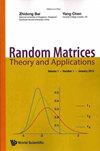超几何权重正交多项式递推系数的微分与差分方程及第六届painlevleve方程的Bäcklund变换
IF 0.6
4区 数学
Q4 PHYSICS, MATHEMATICAL
引用次数: 3
摘要
从[G.](1)具有超几何权值的离散正交多项式,对称积分。几何学。方法[j] .中文信息学报,2014,36 (1):1 - 2 .][公式:见文本]的第六种painlev本文章由计算机程序翻译,如有差异,请以英文原文为准。
Differential and difference equations for recurrence coefficients of orthogonal polynomials with hypergeometric weights and Bäcklund transformations of the sixth Painlevé equation
It is known from [G. Filipuk and W. Van Assche, Discrete orthogonal polynomials with hypergeometric weights and Painlevé VI, Symmetry Integr. Geom. Methods Appl. 14 (2018), Article ID: 088, 19 pp.] that the recurrence coefficients of discrete orthogonal polynomials on the nonnegative integers with hypergeometric weights satisfy a system of nonlinear difference equations. There is also a connection to the solutions of the [Formula: see text]-form of the sixth Painlevé equation (one of the parameters of the weights being the independent variable in the differential equation) [G. Filipuk and W. Van Assche, Discrete orthogonal polynomials with hypergeometric weights and Painlevé VI, Symmetry Integr. Geom. Methods Appl. 14 (2018), Article ID: 088, 19 pp.]. In this paper, we derive a second-order nonlinear difference equation from the system and present explicit formulas showing how this difference equation arises from the Bäcklund transformations of the sixth Painlevé equation. We also present an alternative way to derive the connection between the recurrence coefficients and the solutions of the sixth Painlevé equation.
求助全文
通过发布文献求助,成功后即可免费获取论文全文。
去求助
来源期刊

Random Matrices-Theory and Applications
Decision Sciences-Statistics, Probability and Uncertainty
CiteScore
1.90
自引率
11.10%
发文量
29
期刊介绍:
Random Matrix Theory (RMT) has a long and rich history and has, especially in recent years, shown to have important applications in many diverse areas of mathematics, science, and engineering. The scope of RMT and its applications include the areas of classical analysis, probability theory, statistical analysis of big data, as well as connections to graph theory, number theory, representation theory, and many areas of mathematical physics.
Applications of Random Matrix Theory continue to present themselves and new applications are welcome in this journal. Some examples are orthogonal polynomial theory, free probability, integrable systems, growth models, wireless communications, signal processing, numerical computing, complex networks, economics, statistical mechanics, and quantum theory.
Special issues devoted to single topic of current interest will also be considered and published in this journal.
 求助内容:
求助内容: 应助结果提醒方式:
应助结果提醒方式:


